Evaluating Burden of Proof: A Discussion on Woolmington v D.P.P.
VerifiedAdded on 2023/06/12
|9
|2669
|129
Discussion Board Post
AI Summary
This discussion forum post critically evaluates the statement by Lord Sankey in Woolmington v D.P.P. regarding the prosecution's duty to prove the prisoner's guilt, subject to exceptions like insanity and statutory provisions. It explores the law of presumption, the Human Rights Act of Europe, and reverse onus clauses, referencing key cases and legal principles. The discussion also reflects on the learning process, highlighting the importance of evidence law and human rights in criminal justice. The post concludes that the presumption of innocence is a cornerstone of the criminal justice system, with exceptions for specific circumstances where the burden of proof may shift to the accused.

DISCUSSION FORUM
Paraphrase This Document
Need a fresh take? Get an instant paraphrase of this document with our AI Paraphraser
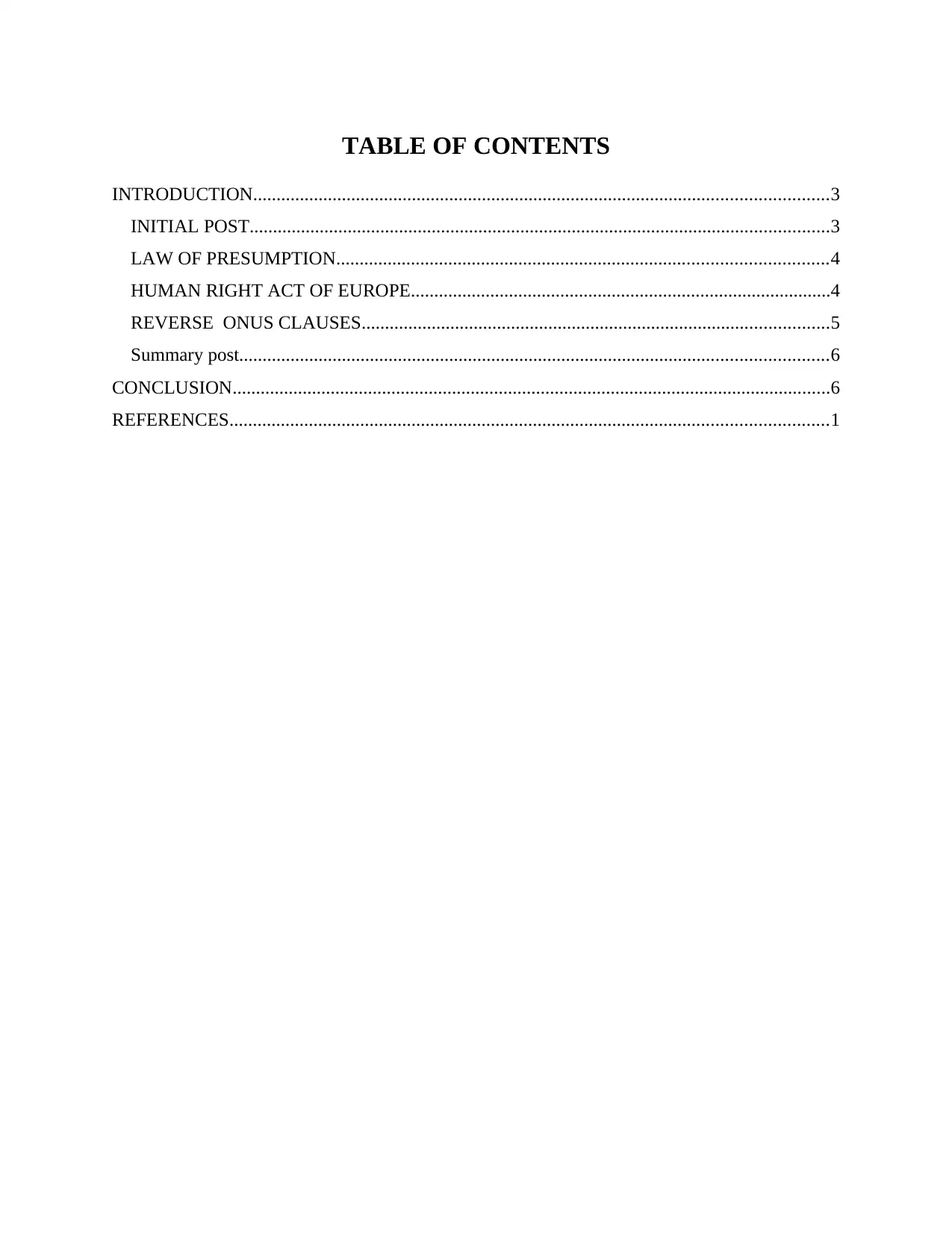
TABLE OF CONTENTS
INTRODUCTION...........................................................................................................................3
INITIAL POST............................................................................................................................3
LAW OF PRESUMPTION.........................................................................................................4
HUMAN RIGHT ACT OF EUROPE..........................................................................................4
REVERSE ONUS CLAUSES....................................................................................................5
Summary post..............................................................................................................................6
CONCLUSION................................................................................................................................6
REFERENCES................................................................................................................................1
INTRODUCTION...........................................................................................................................3
INITIAL POST............................................................................................................................3
LAW OF PRESUMPTION.........................................................................................................4
HUMAN RIGHT ACT OF EUROPE..........................................................................................4
REVERSE ONUS CLAUSES....................................................................................................5
Summary post..............................................................................................................................6
CONCLUSION................................................................................................................................6
REFERENCES................................................................................................................................1
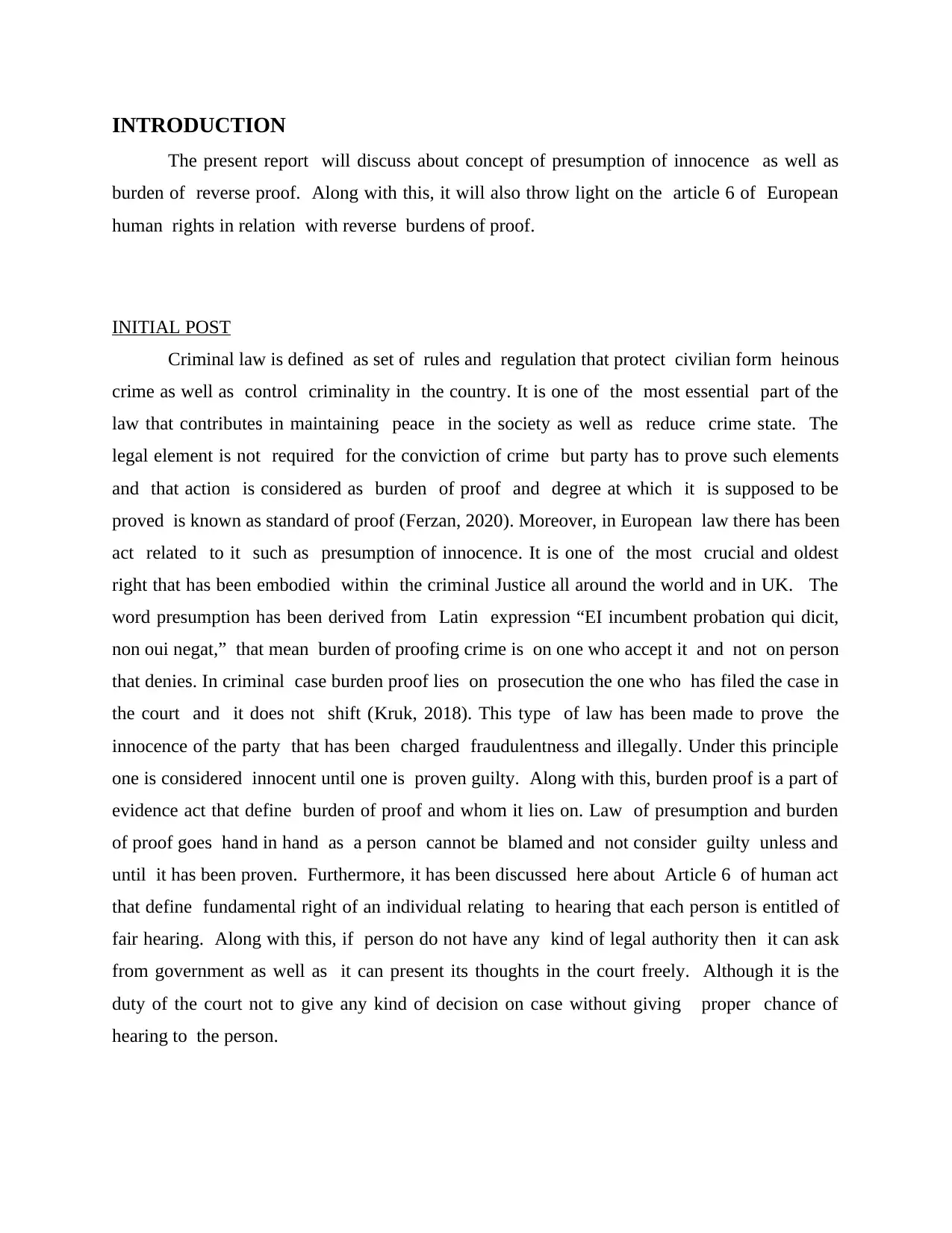
INTRODUCTION
The present report will discuss about concept of presumption of innocence as well as
burden of reverse proof. Along with this, it will also throw light on the article 6 of European
human rights in relation with reverse burdens of proof.
INITIAL POST
Criminal law is defined as set of rules and regulation that protect civilian form heinous
crime as well as control criminality in the country. It is one of the most essential part of the
law that contributes in maintaining peace in the society as well as reduce crime state. The
legal element is not required for the conviction of crime but party has to prove such elements
and that action is considered as burden of proof and degree at which it is supposed to be
proved is known as standard of proof (Ferzan, 2020). Moreover, in European law there has been
act related to it such as presumption of innocence. It is one of the most crucial and oldest
right that has been embodied within the criminal Justice all around the world and in UK. The
word presumption has been derived from Latin expression “EI incumbent probation qui dicit,
non oui negat,” that mean burden of proofing crime is on one who accept it and not on person
that denies. In criminal case burden proof lies on prosecution the one who has filed the case in
the court and it does not shift (Kruk, 2018). This type of law has been made to prove the
innocence of the party that has been charged fraudulentness and illegally. Under this principle
one is considered innocent until one is proven guilty. Along with this, burden proof is a part of
evidence act that define burden of proof and whom it lies on. Law of presumption and burden
of proof goes hand in hand as a person cannot be blamed and not consider guilty unless and
until it has been proven. Furthermore, it has been discussed here about Article 6 of human act
that define fundamental right of an individual relating to hearing that each person is entitled of
fair hearing. Along with this, if person do not have any kind of legal authority then it can ask
from government as well as it can present its thoughts in the court freely. Although it is the
duty of the court not to give any kind of decision on case without giving proper chance of
hearing to the person.
The present report will discuss about concept of presumption of innocence as well as
burden of reverse proof. Along with this, it will also throw light on the article 6 of European
human rights in relation with reverse burdens of proof.
INITIAL POST
Criminal law is defined as set of rules and regulation that protect civilian form heinous
crime as well as control criminality in the country. It is one of the most essential part of the
law that contributes in maintaining peace in the society as well as reduce crime state. The
legal element is not required for the conviction of crime but party has to prove such elements
and that action is considered as burden of proof and degree at which it is supposed to be
proved is known as standard of proof (Ferzan, 2020). Moreover, in European law there has been
act related to it such as presumption of innocence. It is one of the most crucial and oldest
right that has been embodied within the criminal Justice all around the world and in UK. The
word presumption has been derived from Latin expression “EI incumbent probation qui dicit,
non oui negat,” that mean burden of proofing crime is on one who accept it and not on person
that denies. In criminal case burden proof lies on prosecution the one who has filed the case in
the court and it does not shift (Kruk, 2018). This type of law has been made to prove the
innocence of the party that has been charged fraudulentness and illegally. Under this principle
one is considered innocent until one is proven guilty. Along with this, burden proof is a part of
evidence act that define burden of proof and whom it lies on. Law of presumption and burden
of proof goes hand in hand as a person cannot be blamed and not consider guilty unless and
until it has been proven. Furthermore, it has been discussed here about Article 6 of human act
that define fundamental right of an individual relating to hearing that each person is entitled of
fair hearing. Along with this, if person do not have any kind of legal authority then it can ask
from government as well as it can present its thoughts in the court freely. Although it is the
duty of the court not to give any kind of decision on case without giving proper chance of
hearing to the person.
⊘ This is a preview!⊘
Do you want full access?
Subscribe today to unlock all pages.

Trusted by 1+ million students worldwide
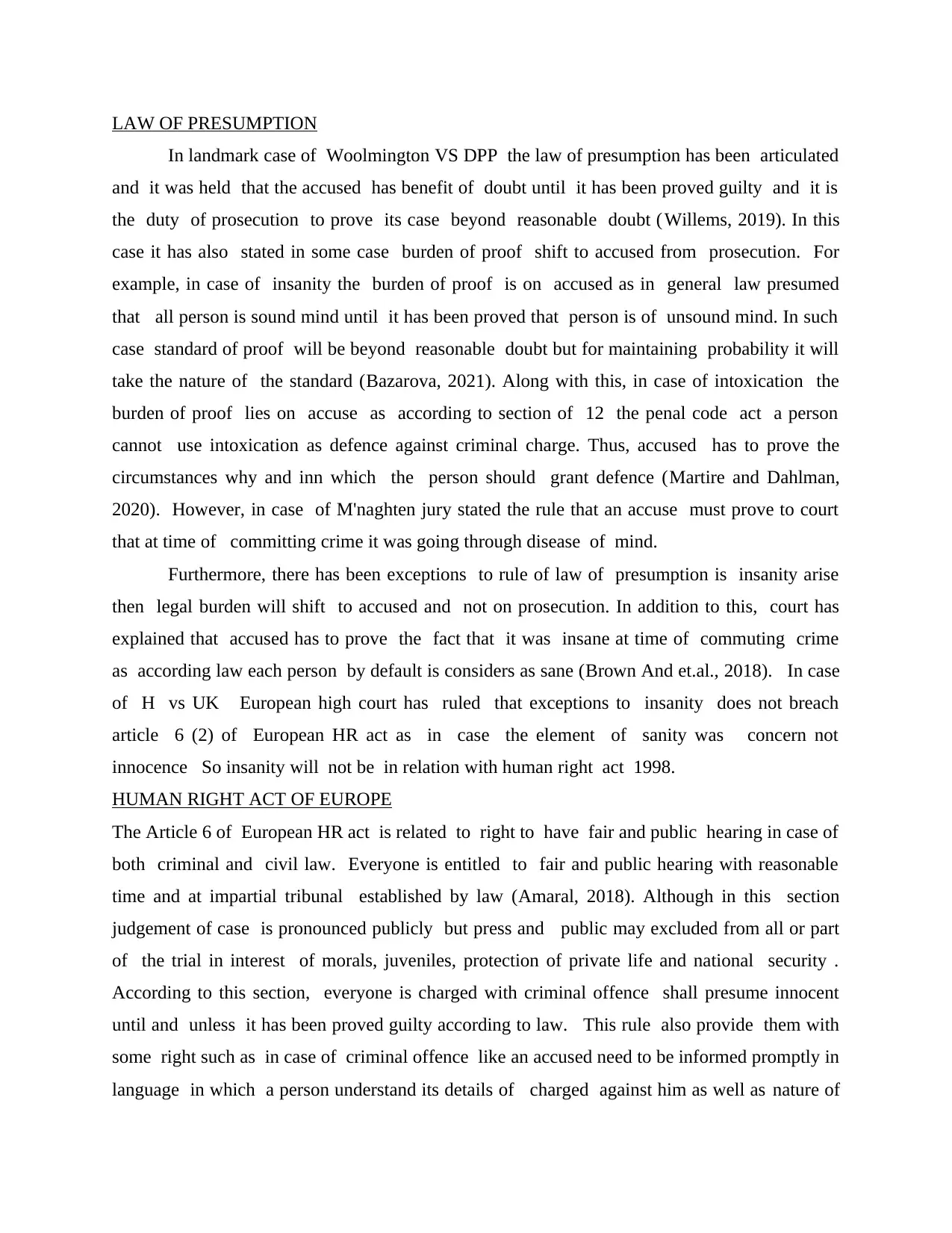
LAW OF PRESUMPTION
In landmark case of Woolmington VS DPP the law of presumption has been articulated
and it was held that the accused has benefit of doubt until it has been proved guilty and it is
the duty of prosecution to prove its case beyond reasonable doubt (Willems, 2019). In this
case it has also stated in some case burden of proof shift to accused from prosecution. For
example, in case of insanity the burden of proof is on accused as in general law presumed
that all person is sound mind until it has been proved that person is of unsound mind. In such
case standard of proof will be beyond reasonable doubt but for maintaining probability it will
take the nature of the standard (Bazarova, 2021). Along with this, in case of intoxication the
burden of proof lies on accuse as according to section of 12 the penal code act a person
cannot use intoxication as defence against criminal charge. Thus, accused has to prove the
circumstances why and inn which the person should grant defence (Martire and Dahlman,
2020). However, in case of M'naghten jury stated the rule that an accuse must prove to court
that at time of committing crime it was going through disease of mind.
Furthermore, there has been exceptions to rule of law of presumption is insanity arise
then legal burden will shift to accused and not on prosecution. In addition to this, court has
explained that accused has to prove the fact that it was insane at time of commuting crime
as according law each person by default is considers as sane (Brown And et.al., 2018). In case
of H vs UK European high court has ruled that exceptions to insanity does not breach
article 6 (2) of European HR act as in case the element of sanity was concern not
innocence So insanity will not be in relation with human right act 1998.
HUMAN RIGHT ACT OF EUROPE
The Article 6 of European HR act is related to right to have fair and public hearing in case of
both criminal and civil law. Everyone is entitled to fair and public hearing with reasonable
time and at impartial tribunal established by law (Amaral, 2018). Although in this section
judgement of case is pronounced publicly but press and public may excluded from all or part
of the trial in interest of morals, juveniles, protection of private life and national security .
According to this section, everyone is charged with criminal offence shall presume innocent
until and unless it has been proved guilty according to law. This rule also provide them with
some right such as in case of criminal offence like an accused need to be informed promptly in
language in which a person understand its details of charged against him as well as nature of
In landmark case of Woolmington VS DPP the law of presumption has been articulated
and it was held that the accused has benefit of doubt until it has been proved guilty and it is
the duty of prosecution to prove its case beyond reasonable doubt (Willems, 2019). In this
case it has also stated in some case burden of proof shift to accused from prosecution. For
example, in case of insanity the burden of proof is on accused as in general law presumed
that all person is sound mind until it has been proved that person is of unsound mind. In such
case standard of proof will be beyond reasonable doubt but for maintaining probability it will
take the nature of the standard (Bazarova, 2021). Along with this, in case of intoxication the
burden of proof lies on accuse as according to section of 12 the penal code act a person
cannot use intoxication as defence against criminal charge. Thus, accused has to prove the
circumstances why and inn which the person should grant defence (Martire and Dahlman,
2020). However, in case of M'naghten jury stated the rule that an accuse must prove to court
that at time of committing crime it was going through disease of mind.
Furthermore, there has been exceptions to rule of law of presumption is insanity arise
then legal burden will shift to accused and not on prosecution. In addition to this, court has
explained that accused has to prove the fact that it was insane at time of commuting crime
as according law each person by default is considers as sane (Brown And et.al., 2018). In case
of H vs UK European high court has ruled that exceptions to insanity does not breach
article 6 (2) of European HR act as in case the element of sanity was concern not
innocence So insanity will not be in relation with human right act 1998.
HUMAN RIGHT ACT OF EUROPE
The Article 6 of European HR act is related to right to have fair and public hearing in case of
both criminal and civil law. Everyone is entitled to fair and public hearing with reasonable
time and at impartial tribunal established by law (Amaral, 2018). Although in this section
judgement of case is pronounced publicly but press and public may excluded from all or part
of the trial in interest of morals, juveniles, protection of private life and national security .
According to this section, everyone is charged with criminal offence shall presume innocent
until and unless it has been proved guilty according to law. This rule also provide them with
some right such as in case of criminal offence like an accused need to be informed promptly in
language in which a person understand its details of charged against him as well as nature of
Paraphrase This Document
Need a fresh take? Get an instant paraphrase of this document with our AI Paraphraser
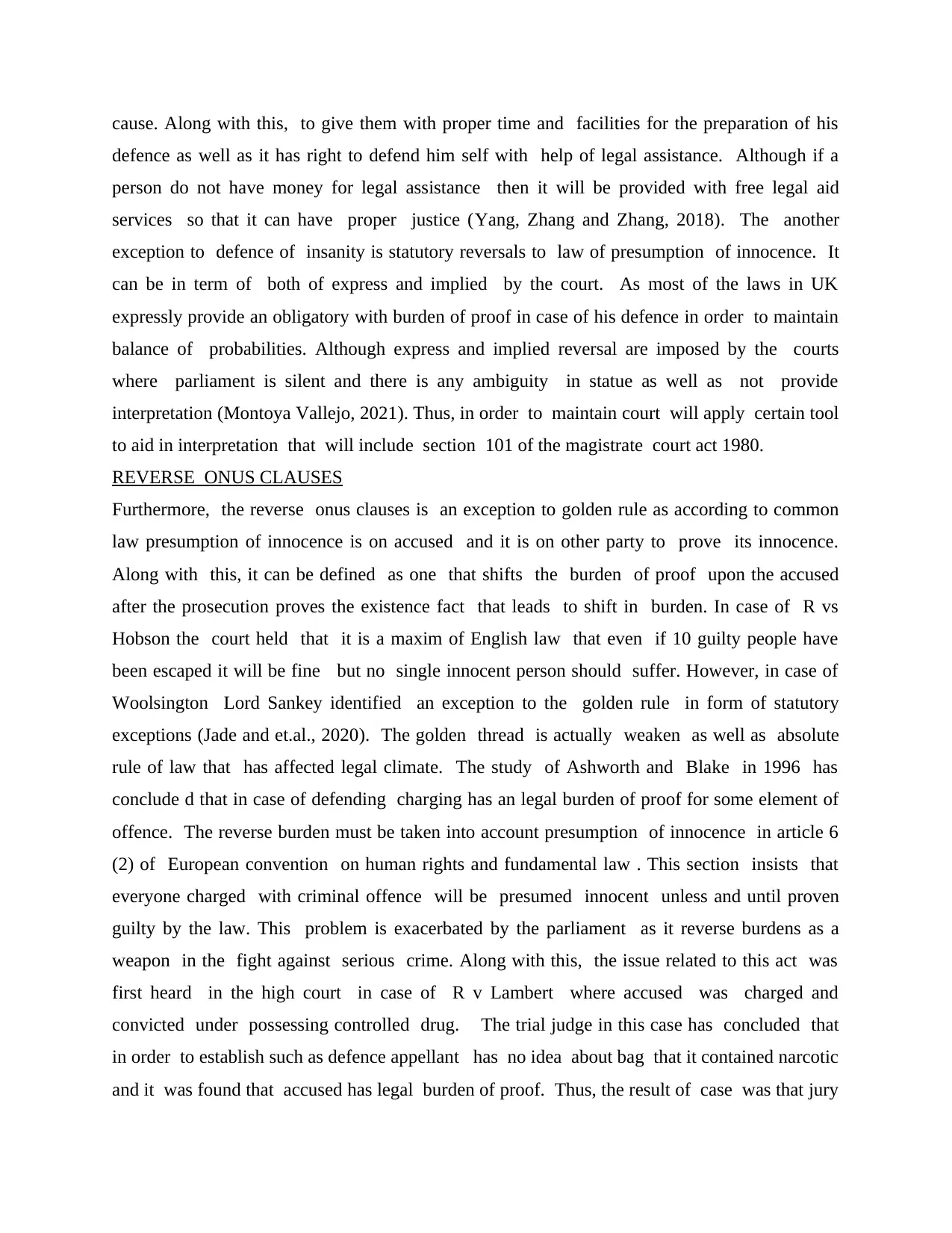
cause. Along with this, to give them with proper time and facilities for the preparation of his
defence as well as it has right to defend him self with help of legal assistance. Although if a
person do not have money for legal assistance then it will be provided with free legal aid
services so that it can have proper justice (Yang, Zhang and Zhang, 2018). The another
exception to defence of insanity is statutory reversals to law of presumption of innocence. It
can be in term of both of express and implied by the court. As most of the laws in UK
expressly provide an obligatory with burden of proof in case of his defence in order to maintain
balance of probabilities. Although express and implied reversal are imposed by the courts
where parliament is silent and there is any ambiguity in statue as well as not provide
interpretation (Montoya Vallejo, 2021). Thus, in order to maintain court will apply certain tool
to aid in interpretation that will include section 101 of the magistrate court act 1980.
REVERSE ONUS CLAUSES
Furthermore, the reverse onus clauses is an exception to golden rule as according to common
law presumption of innocence is on accused and it is on other party to prove its innocence.
Along with this, it can be defined as one that shifts the burden of proof upon the accused
after the prosecution proves the existence fact that leads to shift in burden. In case of R vs
Hobson the court held that it is a maxim of English law that even if 10 guilty people have
been escaped it will be fine but no single innocent person should suffer. However, in case of
Woolsington Lord Sankey identified an exception to the golden rule in form of statutory
exceptions (Jade and et.al., 2020). The golden thread is actually weaken as well as absolute
rule of law that has affected legal climate. The study of Ashworth and Blake in 1996 has
conclude d that in case of defending charging has an legal burden of proof for some element of
offence. The reverse burden must be taken into account presumption of innocence in article 6
(2) of European convention on human rights and fundamental law . This section insists that
everyone charged with criminal offence will be presumed innocent unless and until proven
guilty by the law. This problem is exacerbated by the parliament as it reverse burdens as a
weapon in the fight against serious crime. Along with this, the issue related to this act was
first heard in the high court in case of R v Lambert where accused was charged and
convicted under possessing controlled drug. The trial judge in this case has concluded that
in order to establish such as defence appellant has no idea about bag that it contained narcotic
and it was found that accused has legal burden of proof. Thus, the result of case was that jury
defence as well as it has right to defend him self with help of legal assistance. Although if a
person do not have money for legal assistance then it will be provided with free legal aid
services so that it can have proper justice (Yang, Zhang and Zhang, 2018). The another
exception to defence of insanity is statutory reversals to law of presumption of innocence. It
can be in term of both of express and implied by the court. As most of the laws in UK
expressly provide an obligatory with burden of proof in case of his defence in order to maintain
balance of probabilities. Although express and implied reversal are imposed by the courts
where parliament is silent and there is any ambiguity in statue as well as not provide
interpretation (Montoya Vallejo, 2021). Thus, in order to maintain court will apply certain tool
to aid in interpretation that will include section 101 of the magistrate court act 1980.
REVERSE ONUS CLAUSES
Furthermore, the reverse onus clauses is an exception to golden rule as according to common
law presumption of innocence is on accused and it is on other party to prove its innocence.
Along with this, it can be defined as one that shifts the burden of proof upon the accused
after the prosecution proves the existence fact that leads to shift in burden. In case of R vs
Hobson the court held that it is a maxim of English law that even if 10 guilty people have
been escaped it will be fine but no single innocent person should suffer. However, in case of
Woolsington Lord Sankey identified an exception to the golden rule in form of statutory
exceptions (Jade and et.al., 2020). The golden thread is actually weaken as well as absolute
rule of law that has affected legal climate. The study of Ashworth and Blake in 1996 has
conclude d that in case of defending charging has an legal burden of proof for some element of
offence. The reverse burden must be taken into account presumption of innocence in article 6
(2) of European convention on human rights and fundamental law . This section insists that
everyone charged with criminal offence will be presumed innocent unless and until proven
guilty by the law. This problem is exacerbated by the parliament as it reverse burdens as a
weapon in the fight against serious crime. Along with this, the issue related to this act was
first heard in the high court in case of R v Lambert where accused was charged and
convicted under possessing controlled drug. The trial judge in this case has concluded that
in order to establish such as defence appellant has no idea about bag that it contained narcotic
and it was found that accused has legal burden of proof. Thus, the result of case was that jury
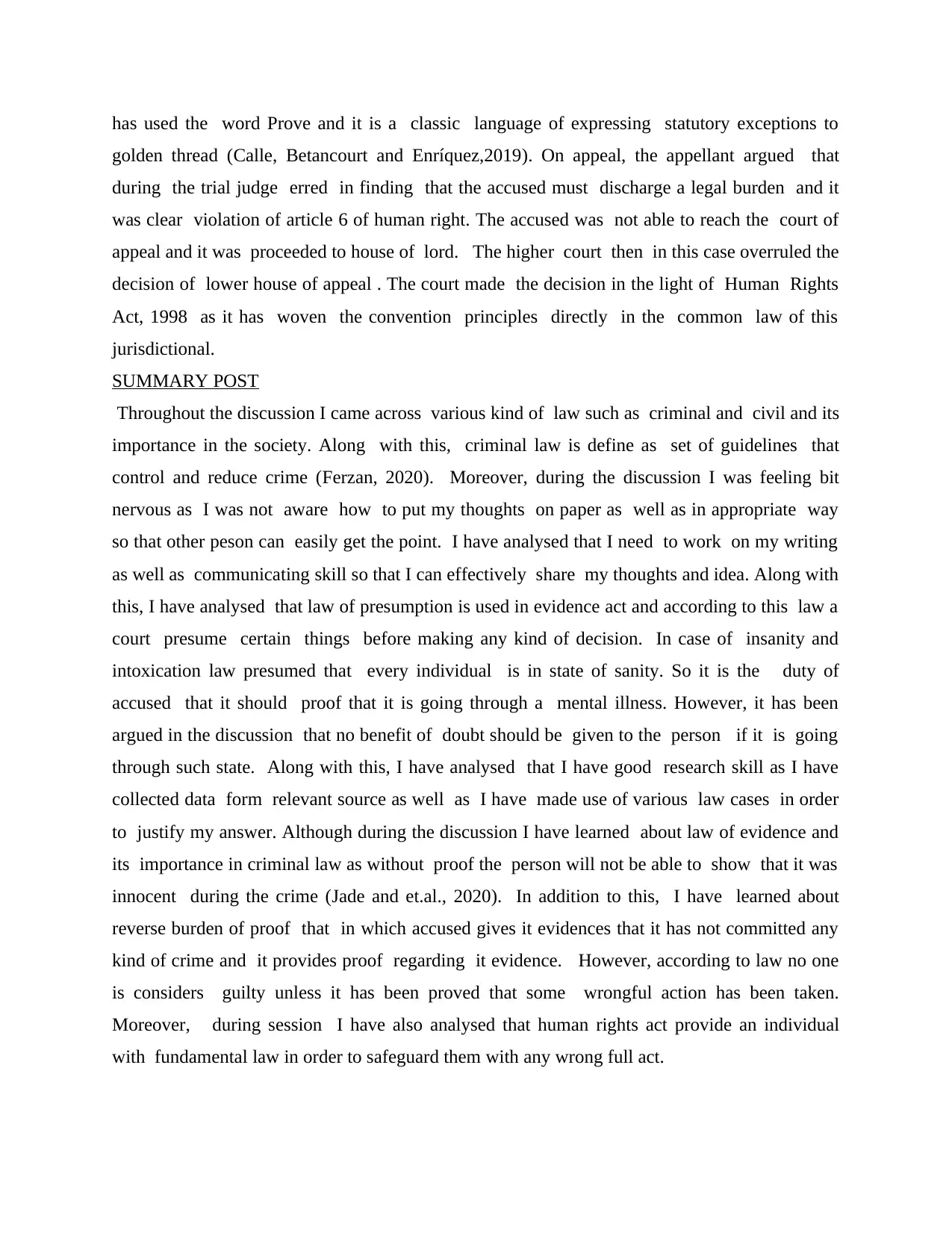
has used the word Prove and it is a classic language of expressing statutory exceptions to
golden thread (Calle, Betancourt and Enríquez,2019). On appeal, the appellant argued that
during the trial judge erred in finding that the accused must discharge a legal burden and it
was clear violation of article 6 of human right. The accused was not able to reach the court of
appeal and it was proceeded to house of lord. The higher court then in this case overruled the
decision of lower house of appeal . The court made the decision in the light of Human Rights
Act, 1998 as it has woven the convention principles directly in the common law of this
jurisdictional.
SUMMARY POST
Throughout the discussion I came across various kind of law such as criminal and civil and its
importance in the society. Along with this, criminal law is define as set of guidelines that
control and reduce crime (Ferzan, 2020). Moreover, during the discussion I was feeling bit
nervous as I was not aware how to put my thoughts on paper as well as in appropriate way
so that other peson can easily get the point. I have analysed that I need to work on my writing
as well as communicating skill so that I can effectively share my thoughts and idea. Along with
this, I have analysed that law of presumption is used in evidence act and according to this law a
court presume certain things before making any kind of decision. In case of insanity and
intoxication law presumed that every individual is in state of sanity. So it is the duty of
accused that it should proof that it is going through a mental illness. However, it has been
argued in the discussion that no benefit of doubt should be given to the person if it is going
through such state. Along with this, I have analysed that I have good research skill as I have
collected data form relevant source as well as I have made use of various law cases in order
to justify my answer. Although during the discussion I have learned about law of evidence and
its importance in criminal law as without proof the person will not be able to show that it was
innocent during the crime (Jade and et.al., 2020). In addition to this, I have learned about
reverse burden of proof that in which accused gives it evidences that it has not committed any
kind of crime and it provides proof regarding it evidence. However, according to law no one
is considers guilty unless it has been proved that some wrongful action has been taken.
Moreover, during session I have also analysed that human rights act provide an individual
with fundamental law in order to safeguard them with any wrong full act.
golden thread (Calle, Betancourt and Enríquez,2019). On appeal, the appellant argued that
during the trial judge erred in finding that the accused must discharge a legal burden and it
was clear violation of article 6 of human right. The accused was not able to reach the court of
appeal and it was proceeded to house of lord. The higher court then in this case overruled the
decision of lower house of appeal . The court made the decision in the light of Human Rights
Act, 1998 as it has woven the convention principles directly in the common law of this
jurisdictional.
SUMMARY POST
Throughout the discussion I came across various kind of law such as criminal and civil and its
importance in the society. Along with this, criminal law is define as set of guidelines that
control and reduce crime (Ferzan, 2020). Moreover, during the discussion I was feeling bit
nervous as I was not aware how to put my thoughts on paper as well as in appropriate way
so that other peson can easily get the point. I have analysed that I need to work on my writing
as well as communicating skill so that I can effectively share my thoughts and idea. Along with
this, I have analysed that law of presumption is used in evidence act and according to this law a
court presume certain things before making any kind of decision. In case of insanity and
intoxication law presumed that every individual is in state of sanity. So it is the duty of
accused that it should proof that it is going through a mental illness. However, it has been
argued in the discussion that no benefit of doubt should be given to the person if it is going
through such state. Along with this, I have analysed that I have good research skill as I have
collected data form relevant source as well as I have made use of various law cases in order
to justify my answer. Although during the discussion I have learned about law of evidence and
its importance in criminal law as without proof the person will not be able to show that it was
innocent during the crime (Jade and et.al., 2020). In addition to this, I have learned about
reverse burden of proof that in which accused gives it evidences that it has not committed any
kind of crime and it provides proof regarding it evidence. However, according to law no one
is considers guilty unless it has been proved that some wrongful action has been taken.
Moreover, during session I have also analysed that human rights act provide an individual
with fundamental law in order to safeguard them with any wrong full act.
⊘ This is a preview!⊘
Do you want full access?
Subscribe today to unlock all pages.

Trusted by 1+ million students worldwide
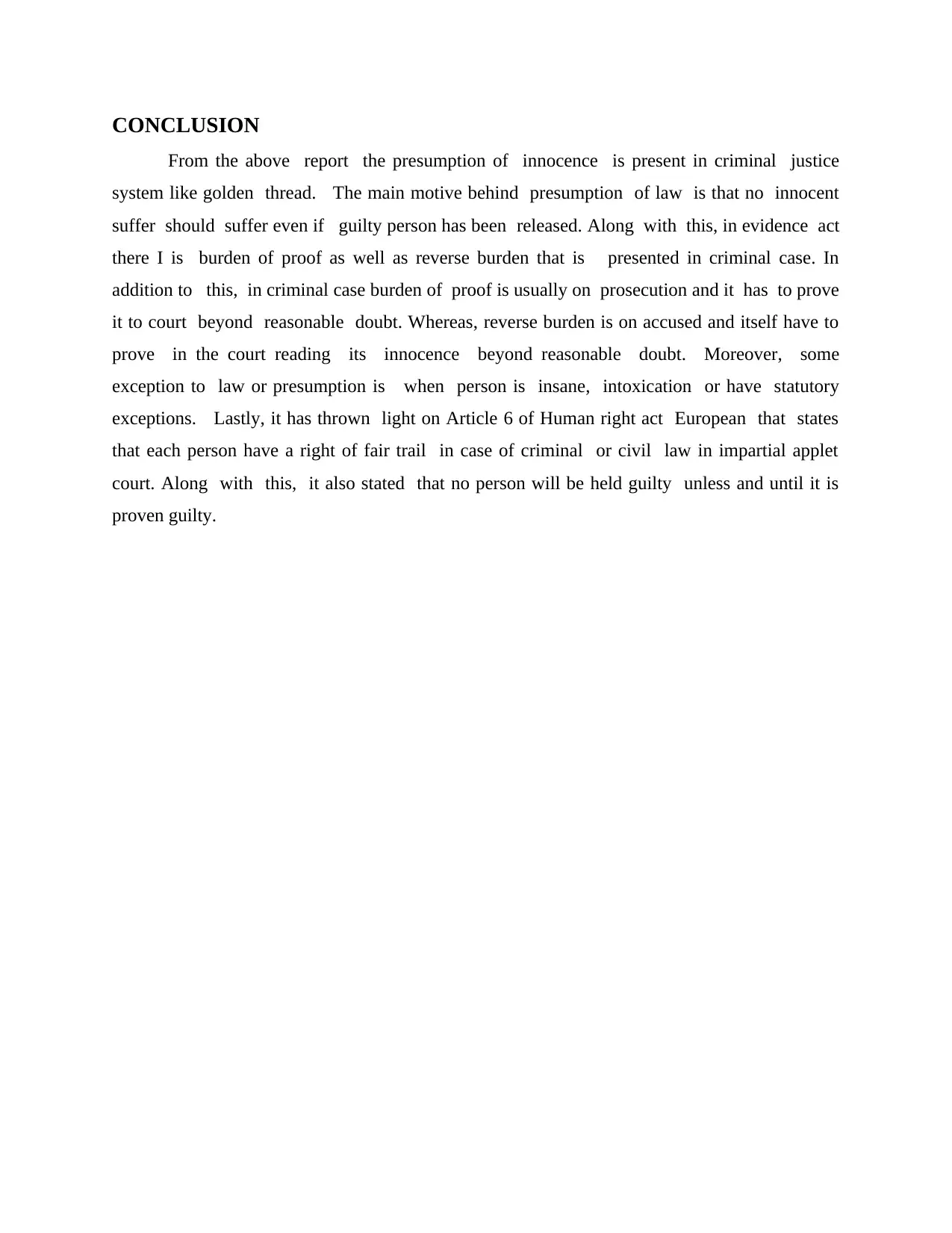
CONCLUSION
From the above report the presumption of innocence is present in criminal justice
system like golden thread. The main motive behind presumption of law is that no innocent
suffer should suffer even if guilty person has been released. Along with this, in evidence act
there I is burden of proof as well as reverse burden that is presented in criminal case. In
addition to this, in criminal case burden of proof is usually on prosecution and it has to prove
it to court beyond reasonable doubt. Whereas, reverse burden is on accused and itself have to
prove in the court reading its innocence beyond reasonable doubt. Moreover, some
exception to law or presumption is when person is insane, intoxication or have statutory
exceptions. Lastly, it has thrown light on Article 6 of Human right act European that states
that each person have a right of fair trail in case of criminal or civil law in impartial applet
court. Along with this, it also stated that no person will be held guilty unless and until it is
proven guilty.
From the above report the presumption of innocence is present in criminal justice
system like golden thread. The main motive behind presumption of law is that no innocent
suffer should suffer even if guilty person has been released. Along with this, in evidence act
there I is burden of proof as well as reverse burden that is presented in criminal case. In
addition to this, in criminal case burden of proof is usually on prosecution and it has to prove
it to court beyond reasonable doubt. Whereas, reverse burden is on accused and itself have to
prove in the court reading its innocence beyond reasonable doubt. Moreover, some
exception to law or presumption is when person is insane, intoxication or have statutory
exceptions. Lastly, it has thrown light on Article 6 of Human right act European that states
that each person have a right of fair trail in case of criminal or civil law in impartial applet
court. Along with this, it also stated that no person will be held guilty unless and until it is
proven guilty.
Paraphrase This Document
Need a fresh take? Get an instant paraphrase of this document with our AI Paraphraser
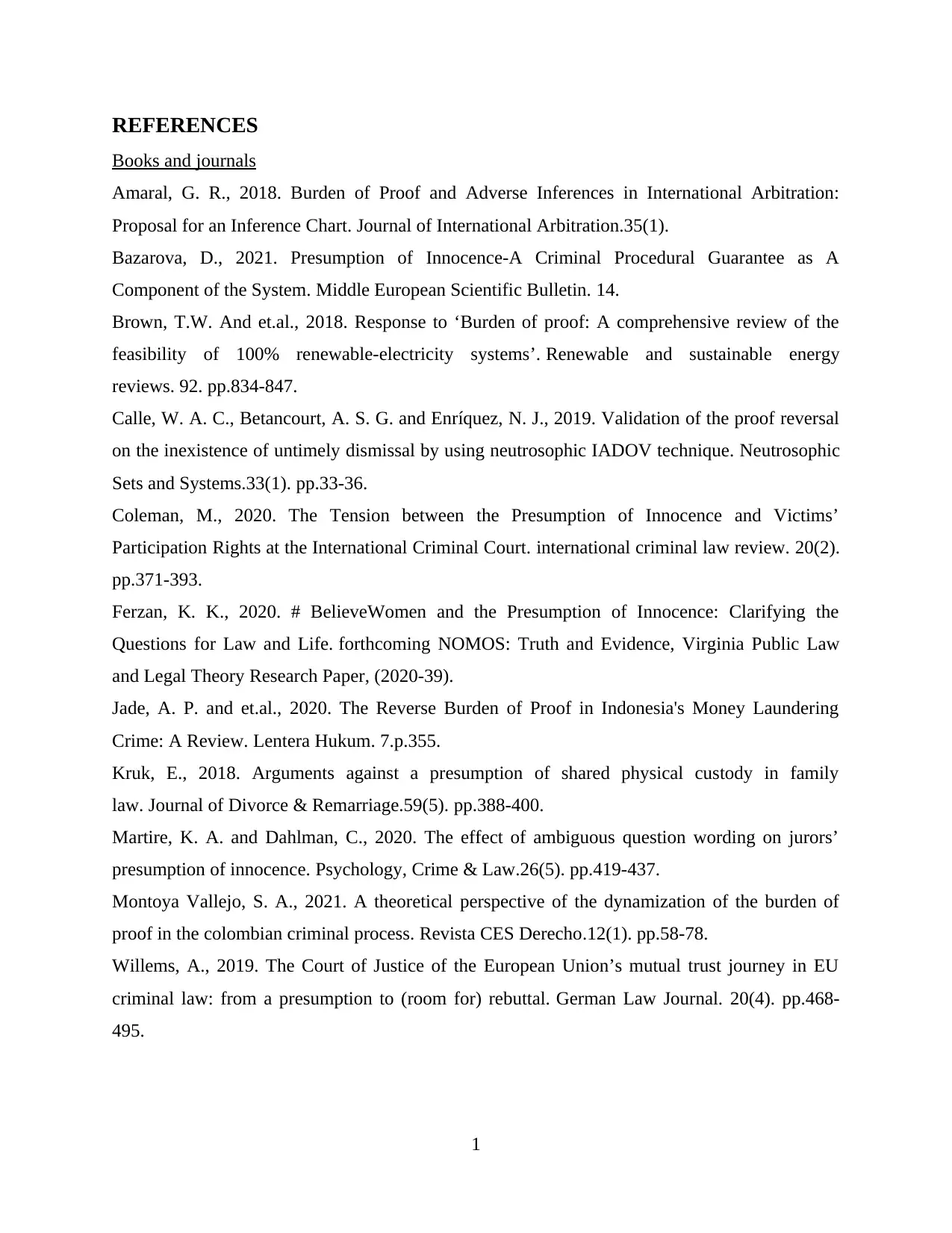
REFERENCES
Books and journals
Amaral, G. R., 2018. Burden of Proof and Adverse Inferences in International Arbitration:
Proposal for an Inference Chart. Journal of International Arbitration.35(1).
Bazarova, D., 2021. Presumption of Innocence-A Criminal Procedural Guarantee as A
Component of the System. Middle European Scientific Bulletin. 14.
Brown, T.W. And et.al., 2018. Response to ‘Burden of proof: A comprehensive review of the
feasibility of 100% renewable-electricity systems’. Renewable and sustainable energy
reviews. 92. pp.834-847.
Calle, W. A. C., Betancourt, A. S. G. and Enríquez, N. J., 2019. Validation of the proof reversal
on the inexistence of untimely dismissal by using neutrosophic IADOV technique. Neutrosophic
Sets and Systems.33(1). pp.33-36.
Coleman, M., 2020. The Tension between the Presumption of Innocence and Victims’
Participation Rights at the International Criminal Court. international criminal law review. 20(2).
pp.371-393.
Ferzan, K. K., 2020. # BelieveWomen and the Presumption of Innocence: Clarifying the
Questions for Law and Life. forthcoming NOMOS: Truth and Evidence, Virginia Public Law
and Legal Theory Research Paper, (2020-39).
Jade, A. P. and et.al., 2020. The Reverse Burden of Proof in Indonesia's Money Laundering
Crime: A Review. Lentera Hukum. 7.p.355.
Kruk, E., 2018. Arguments against a presumption of shared physical custody in family
law. Journal of Divorce & Remarriage.59(5). pp.388-400.
Martire, K. A. and Dahlman, C., 2020. The effect of ambiguous question wording on jurors’
presumption of innocence. Psychology, Crime & Law.26(5). pp.419-437.
Montoya Vallejo, S. A., 2021. A theoretical perspective of the dynamization of the burden of
proof in the colombian criminal process. Revista CES Derecho.12(1). pp.58-78.
Willems, A., 2019. The Court of Justice of the European Union’s mutual trust journey in EU
criminal law: from a presumption to (room for) rebuttal. German Law Journal. 20(4). pp.468-
495.
1
Books and journals
Amaral, G. R., 2018. Burden of Proof and Adverse Inferences in International Arbitration:
Proposal for an Inference Chart. Journal of International Arbitration.35(1).
Bazarova, D., 2021. Presumption of Innocence-A Criminal Procedural Guarantee as A
Component of the System. Middle European Scientific Bulletin. 14.
Brown, T.W. And et.al., 2018. Response to ‘Burden of proof: A comprehensive review of the
feasibility of 100% renewable-electricity systems’. Renewable and sustainable energy
reviews. 92. pp.834-847.
Calle, W. A. C., Betancourt, A. S. G. and Enríquez, N. J., 2019. Validation of the proof reversal
on the inexistence of untimely dismissal by using neutrosophic IADOV technique. Neutrosophic
Sets and Systems.33(1). pp.33-36.
Coleman, M., 2020. The Tension between the Presumption of Innocence and Victims’
Participation Rights at the International Criminal Court. international criminal law review. 20(2).
pp.371-393.
Ferzan, K. K., 2020. # BelieveWomen and the Presumption of Innocence: Clarifying the
Questions for Law and Life. forthcoming NOMOS: Truth and Evidence, Virginia Public Law
and Legal Theory Research Paper, (2020-39).
Jade, A. P. and et.al., 2020. The Reverse Burden of Proof in Indonesia's Money Laundering
Crime: A Review. Lentera Hukum. 7.p.355.
Kruk, E., 2018. Arguments against a presumption of shared physical custody in family
law. Journal of Divorce & Remarriage.59(5). pp.388-400.
Martire, K. A. and Dahlman, C., 2020. The effect of ambiguous question wording on jurors’
presumption of innocence. Psychology, Crime & Law.26(5). pp.419-437.
Montoya Vallejo, S. A., 2021. A theoretical perspective of the dynamization of the burden of
proof in the colombian criminal process. Revista CES Derecho.12(1). pp.58-78.
Willems, A., 2019. The Court of Justice of the European Union’s mutual trust journey in EU
criminal law: from a presumption to (room for) rebuttal. German Law Journal. 20(4). pp.468-
495.
1

Yang, F., Zhang, T. and Zhang, H., 2018. Adjudicating environmental tort cases in China:
Burden of proof, causation, and insights from 513 court decisions. Asia Pacific Journal of
Environmental Law. 21(2). pp.171-189.
2
Burden of proof, causation, and insights from 513 court decisions. Asia Pacific Journal of
Environmental Law. 21(2). pp.171-189.
2
⊘ This is a preview!⊘
Do you want full access?
Subscribe today to unlock all pages.

Trusted by 1+ million students worldwide
1 out of 9
Related Documents
Your All-in-One AI-Powered Toolkit for Academic Success.
+13062052269
info@desklib.com
Available 24*7 on WhatsApp / Email
![[object Object]](/_next/static/media/star-bottom.7253800d.svg)
Unlock your academic potential
Copyright © 2020–2026 A2Z Services. All Rights Reserved. Developed and managed by ZUCOL.





